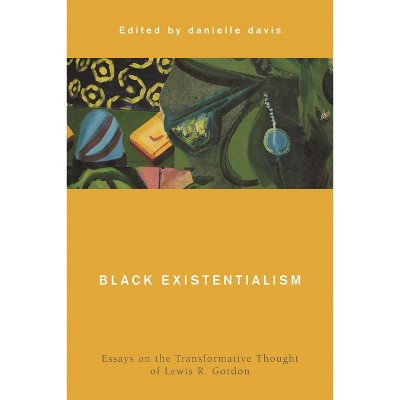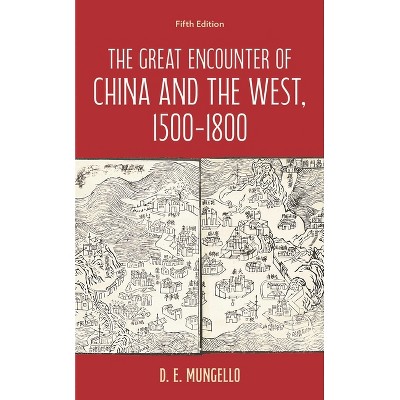Sponsored

Blackening Britain - (Global Critical Caribbean Thought) by James G Cantres (Paperback)
In Stock
Sponsored
About this item
Highlights
- Covering the period from the interwar years through the arrival of the steamship SS Empire Windrush from Jamaica in 1948 and culminating in the period of decolonization in the British Caribbean by the early 1970s, this project situates the development of networks of communication, categories of identification, and Caribbean radical politics both in the metropole and abroad.
- About the Author: James Cantres is associate professor in Africana, Puerto Rican & Latino Studies at Hunter College and in the Department of History at the Graduate Center, both of the City University of New York where he specializes in migration, black internationalisms, radical politics, cultural formations, Africana epistemologies, and making Black worlds throughout African Atlantic geographies.
- 270 Pages
- Philosophy, Political
- Series Name: Global Critical Caribbean Thought
Description
About the Book
Blackening Britain explores the key moments, figures, and patterns of radical black political development among Caribbean and African migrants in Britain after World War II. Ultimately, the move away from British identity and a radical, revolutionary consciousness rooted in th...Book Synopsis
Covering the period from the interwar years through the arrival of the steamship SS Empire Windrush from Jamaica in 1948 and culminating in the period of decolonization in the British Caribbean by the early 1970s, this project situates the development of networks of communication, categories of identification, and Caribbean radical politics both in the metropole and abroad. Blackening Britain explores how articulations of Caribbean identity formation corresponded to the following themes: organic collective action, political mobilization, cultural expressions of shared consciousness, and novel patterns of communication. Blackening Britain shows how colonial migrants developed tools of resistance in the imperial center predicated on their racialized consciousness that emerged from their experiences of alienation and discrimination in Britain.This book also interrogates the ways in which prominent West Indian activists, intellectuals, political actors, and artists conceived of their relationship to Britain. Ultimately, this work shows a move away from British identity and a radical, revolutionary consciousness rooted in the West Indian background and forged in the contentious space of metropolitan Britain.
Review Quotes
A significant contribution to the growing literature on Caribbean organisations, activists and writers in the post-war period, from the Manchester Pan-African Congress to the Black Power Movement and beyond.
Blackening Britain begins with the taller trees, such as Harold Moody, in the urban forests of 1950s British race relations. From these heights, this comprehensive text plunges its readers into the thick and violent undergrowth, where the struggles of Black immigrants to survive remained for decades at the level of life and death. It closes with Black political and intellectual responses to these bitter racial struggles. Most definitely an informative and engaging read.
Cantres traces the emergence and consolidation of a radical consciousness among West Indians in mid-20th-century Britain. Drawing on a broad range of primary sources and secondary materials, Cantres begins by looking at the Caribbean situation before and immediately after WW II, including the fifth Pan-African Congress convened in Manchester, UK, in 1945. He describes the initial responses of uprooted intellectuals to living at the geographical center of a declining colonial power. He details the response of both activists and ordinary émigrés to the Notting Hill race riots of 1958, and he explains how such organizations as the West Indian Student Centre accommodated young aspirants to the challenging realities of the British education system. The restrictions of the Commonwealth Immigrants Act of 1962 helped provoke the emergence of a Black Power movement in the wake of the inflammatory rhetoric of Enoch Powell. The Caribbean Artists Movement organized a conference in 1968 that contested passive assimilation, and groups such as the Black Eagles, led by Michael X, embodied a revolutionary consciousness. The author argues that by the 1970s Black thinkers had created a blueprint for political resistance and autonomy. Recommended.
In Blackening Britain, James Cantres argues that West Indians in Britain did much more than pursue British identity and citizenship. Grounded in a racialized consciousness and pulling from transnational political imaginaries, they rejected the British state as the arbiter of identity construction and cultivated a more radical "post-nationalist perspective." An important contribution to the growing body of work on Black Britain.
About the Author
James Cantres is associate professor in Africana, Puerto Rican & Latino Studies at Hunter College and in the Department of History at the Graduate Center, both of the City University of New York where he specializes in migration, black internationalisms, radical politics, cultural formations, Africana epistemologies, and making Black worlds throughout African Atlantic geographies.Shipping details
Return details
Trending Philosophy











